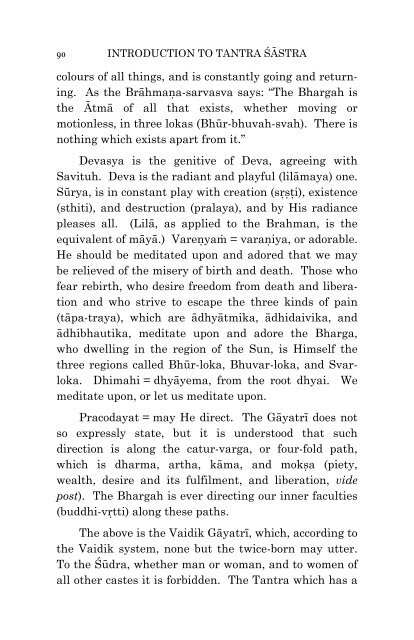Introduction to Tantra Sastra - Aghori
Introduction to Tantra Sastra - Aghori
Introduction to Tantra Sastra - Aghori
Create successful ePaper yourself
Turn your PDF publications into a flip-book with our unique Google optimized e-Paper software.
90<br />
INTRODUCTION TO TANTRA ŚĀSTRA<br />
colours of all things, and is constantly going and returning.<br />
As the Brāhmaṇ a-sarvasva says: “The Bhargah is<br />
the Ātmā of all that exists, whether moving or<br />
motionless, in three lokas (Bhūr-bhuvah-svah). There is<br />
nothing which exists apart from it.”<br />
Devasya is the genitive of Deva, agreeing with<br />
Savituh. Deva is the radiant and playful (lilāmaya) one.<br />
Sūrya, is in constant play with creation (sṛ ṣṭ i), existence<br />
(sthiti), and destruction (pralaya), and by His radiance<br />
pleases all. (Lilā, as applied <strong>to</strong> the Brahman, is the<br />
equivalent of māyā.) Vareṇ yaṃ = varaṇ iya, or adorable.<br />
He should be meditated upon and adored that we may<br />
be relieved of the misery of birth and death. Those who<br />
fear rebirth, who desire freedom from death and liberation<br />
and who strive <strong>to</strong> escape the three kinds of pain<br />
(tāpa-traya), which are ādhyātmika, ādhidaivika, and<br />
ādhibhautika, meditate upon and adore the Bharga,<br />
who dwelling in the region of the Sun, is Himself the<br />
three regions called Bhūr-loka, Bhuvar-loka, and Svarloka.<br />
Dhimahi = dhyāyema, from the root dhyai. We<br />
meditate upon, or let us meditate upon.<br />
Pracodayat = may He direct. The Gāyatrī does not<br />
so expressly state, but it is unders<strong>to</strong>od that such<br />
direction is along the catur-varga, or four-fold path,<br />
which is dharma, artha, kāma, and mokṣa (piety,<br />
wealth, desire and its fulfilment, and liberation, vide<br />
post). The Bhargah is ever directing our inner faculties<br />
(buddhi-vṛ tti) along these paths.<br />
The above is the Vaidik Gāyatrī, which, according <strong>to</strong><br />
the Vaidik system, none but the twice-born may utter.<br />
To the Śūdra, whether man or woman, and <strong>to</strong> women of<br />
all other castes it is forbidden. The <strong>Tantra</strong> which has a

















